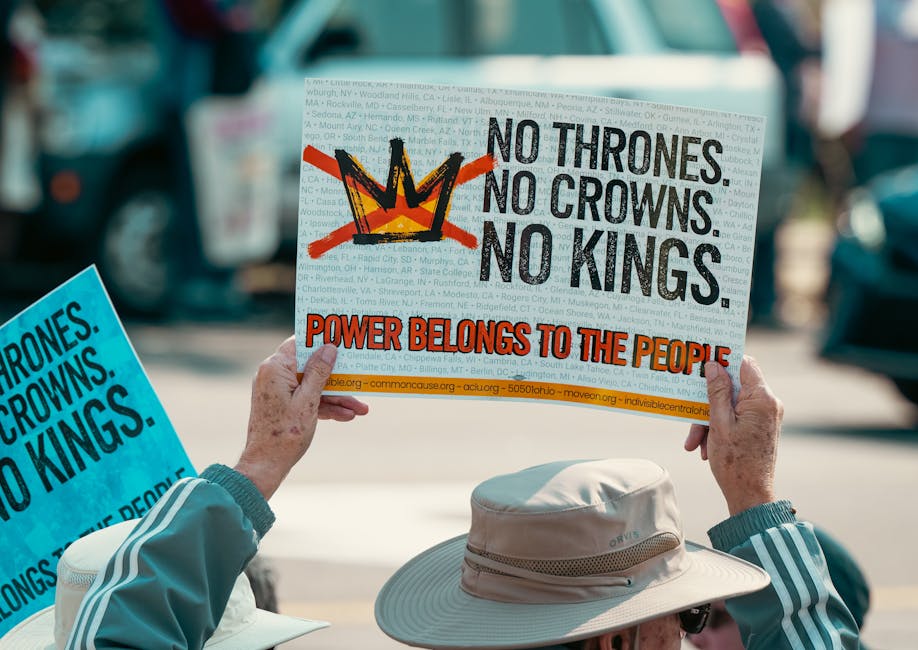This past Saturday, India witnessed a historic wave of protests as citizens across the country took to the streets under the banner of the ‘No Kings’ movement. Organized by a coalition of civil society groups, student organizations, and political activists, the demonstrations were a resounding call against authoritarianism, unchecked power, and the erosion of democratic values. From bustling metropolises to smaller towns, the protests painted a vivid picture of a nation demanding accountability and transparency from its leaders.
The ‘No Kings’ movement, which has been gaining momentum over the past few months, derives its name from its core message: no individual or institution should wield unchecked power, and democracy must remain truly participatory. The protests were sparked by a series of controversial policies, allegations of corruption, and growing concerns about the centralization of power.
Delhi: The Epicenter of Dissent
In the capital city of Delhi, thousands gathered at Jantar Mantar, the iconic protest site, waving placards and chanting slogans such as “We the People, Not One King” and “Democracy Over Dynasty.” The crowd was a diverse mix of students, professionals, farmers, and activists, united by their shared frustration with the current political climate. Prominent social activists and opposition leaders addressed the gathering, urging citizens to remain vigilant and fight for their constitutional rights.
“This is not just a protest; it is a movement to reclaim our democracy,” said a student leader from Jawaharlal Nehru University. “We are here to remind those in power that they are servants of the people, not rulers.”
Mumbai: A Sea of Voices
In Mumbai, the protests took on a vibrant and creative tone, with artists, musicians, and theater groups joining the demonstrations. Marine Drive was transformed into a stage for dissent, as performers used music, poetry, and street plays to convey their message. “Art has always been a powerful tool for resistance,” said a Mumbai-based filmmaker. “Today, we are using it to remind people that silence is not an option.”
The protests in Mumbai also highlighted the economic struggles faced by ordinary citizens, with many participants expressing concerns about rising unemployment, inflation, and the growing wealth gap. “We are not just protesting against political power; we are fighting for a fairer and more just society,” said a protester from the city’s working-class neighborhood of Dharavi.
Chennai and Kolkata: Regional Concerns Take Center Stage
In Chennai, the ‘No Kings’ protests were marked by a strong focus on regional autonomy and the rights of states. Protesters criticized what they described as the “imposition of central policies” and called for greater respect for federalism. “India is a union of states, not a kingdom ruled from Delhi,” said a Tamil Nadu-based activist.
Meanwhile, in Kolkata, the demonstrations were infused with the city’s rich history of political activism. Thousands marched from College Square to Esplanade, carrying torches and chanting slogans in Bengali. The protests also addressed issues specific to West Bengal, including concerns about agricultural policies and the treatment of minority communities.
Rural India: The Heartbeat of the Movement
While the protests in urban centers captured much of the media attention, the ‘No Kings’ movement also resonated deeply in rural India. In villages across states like Uttar Pradesh, Rajasthan, and Maharashtra, farmers and laborers organized rallies to voice their grievances. For many, the protests were a rare opportunity to challenge the systemic injustices they face daily.
“We have been ignored for too long,” said a farmer from Uttar Pradesh. “This movement is our chance to demand better policies and a government that listens to us.”
A Nationwide Call for Change
The ‘No Kings’ protests were notable not just for their scale but also for their peaceful and inclusive nature. Despite the large crowds, there were no reports of violence or clashes with law enforcement, a testament to the organizers’ emphasis on nonviolent resistance.
As the sun set on Saturday, the message from the protests was clear: the people of India are watching, and they will not remain silent. The ‘No Kings’ movement has ignited a nationwide conversation about power, accountability, and the future of Indian democracy. Whether it will lead to tangible change remains to be seen, but one thing is certain—the spirit of dissent is alive and well in India.
Stay tuned to NextMinuteNews for more updates on this developing story.




